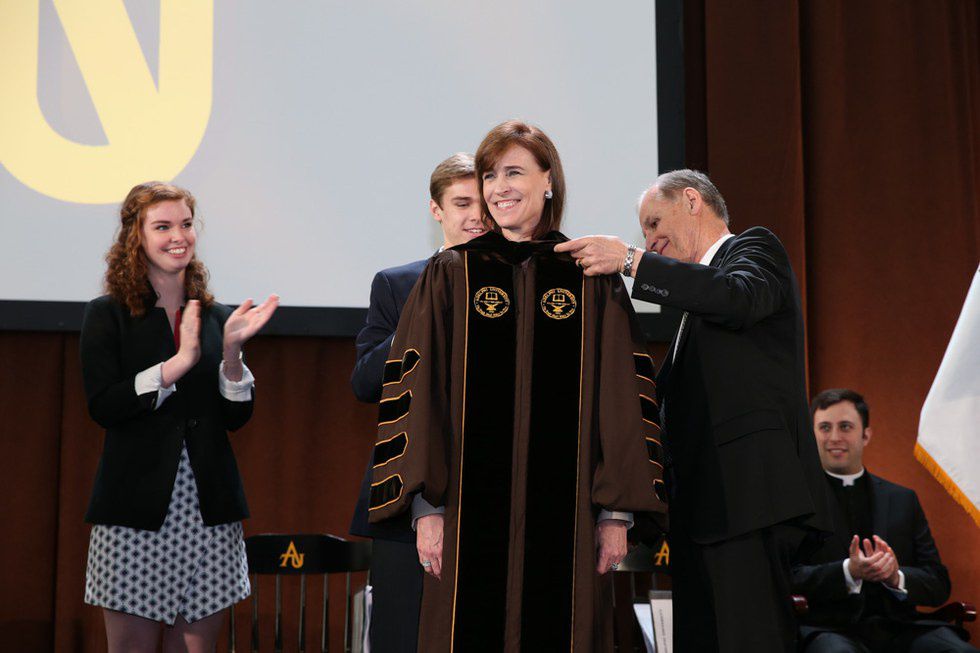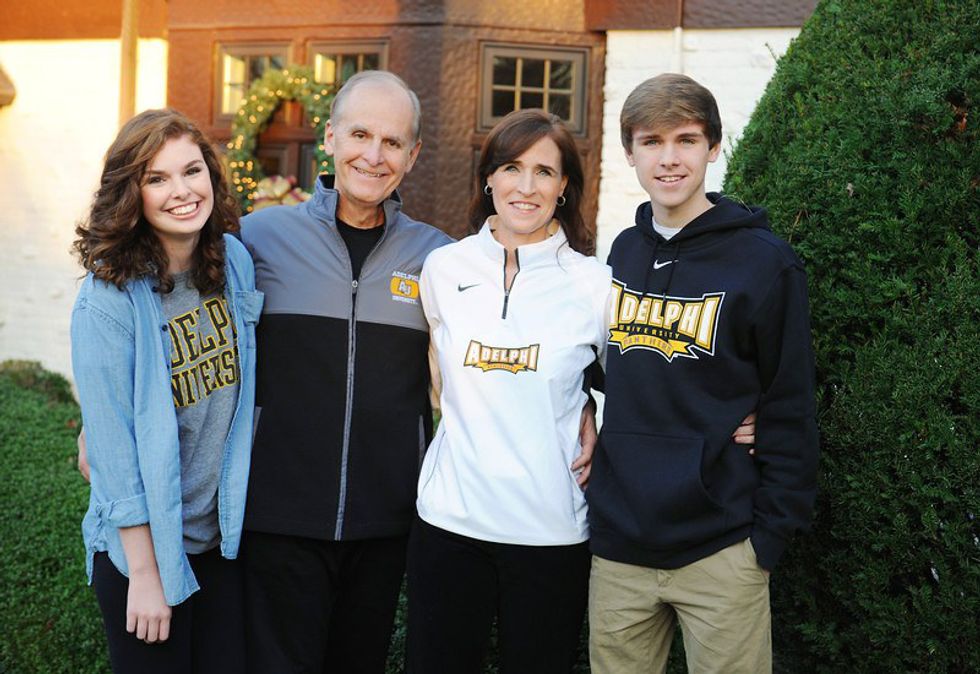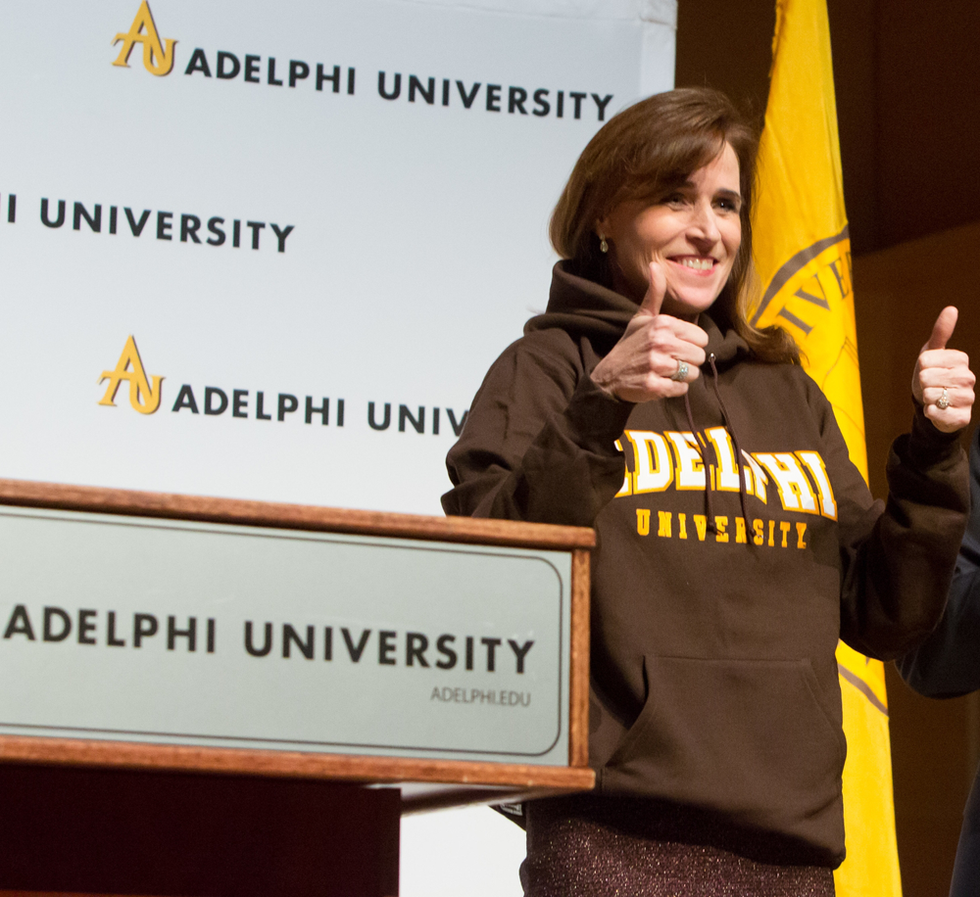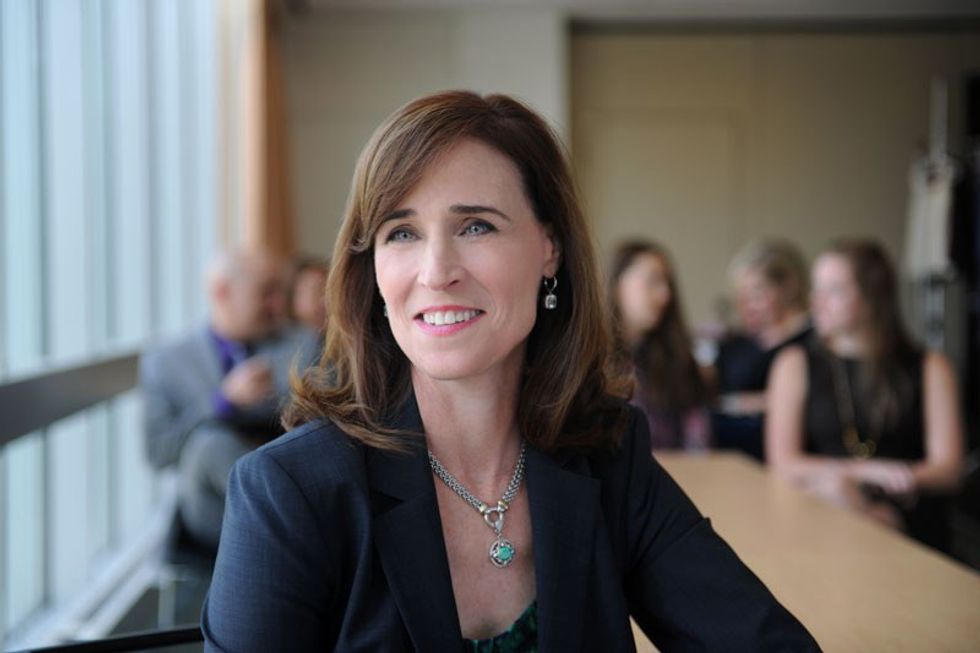Adelphi University president, Dr. Christine M. Riordan, has been serving as a fresh-face to the Garden City community, ending the all male streak which served before her.
Described by students as "amicable," and "passionate," not only is Dr. Riordan the first female president of the university, but she is characterized as being one of the most hands-on and involved leaders to serve the community in a while.
I had the pleasure to meet with her last Tuesday, May 10th, to find out why she is so appealing to the general student body.
How do you envision utilizing social media to deepen your connection with students and faculty at Adelphi University?
"I think just given this generation we have to be digital. I think that people communicate a lot of things, whether it’s Facebook, or Twitter, or Instagram, or LinkedIn, and I think there are fun things we can do. I love the Adelphi Bunnies Instagram account. It shows our personality for being fun. So I think in many cases we can use social media to talk about the fun things. Social media is also used to get the word out about things happening on campus. I think we’ve been trying to use it to get out what I call the “intellectual life” of Adelphi, and that’s what I think Odyssey is really about.
It’s kind of a combination of the culture and the personality of the students, and the intellectual life of everyone else… You know, I think the other thing it’s been useful for is dealing with issues. We don't always like to talk about issues, but when we started making changes with Lackman, it was automatic. You could just tweet when there was no more milk, and I think that social media is just another way that you can provide customer service. I’ve always had a challenge which is why I ask the students: “What is the best way to get the word out?” And I think that we know our students.”
I see you earned your degree in engineering at Georgia Tech and your Ph.D and MBA at Georgia State. What made you come up to Long Island?
“Right when I got out of college, I started working for a company that was putting PCs in banks, and Chase bank was in Manhattan so I started coming here when I was 23 and working. Then I worked with AT&T in New Jersey very early in my career. For the last 20 years, I’ve been recruiting students out of New York… I love New York, and it was a really natural transition for me… We have grits in Atlanta, but Atlanta’s traffic is just as bad as Long Island.”
In terms of diversity, what are some of the differences in demographics from where you attended school to the Garden City campus which Adelphi currently resides?
"I don’t think that’s an area change as much as it is a generation change. When I was in school at Georgia Tech, there were maybe 10% women in the entire university, and I’d say now… they’re getting close to 30-40%. They have a strong initiative getting women involved in STEM. In terms of the diversity of our student population, I think throughout the country, when we look at Long Island and New York, it’s changing quite a bit, and I always say to people that the next 18 years of students have already been born so it’s not a guessing game for us and universities.
The census data is already there and we know where college-aged students are living with their families. And so we do know that when we look at a heat map of the U.S., demographics are changing. College students are declining particularly in the Northeast, and they're growing down in the South. And really in Texas and California.
As we think about the university, it's really about where we're going to recruit the students from and how we attract students from out of the area who may not know about Adelphi and Garden City, and getting them to think through what it might be like to come to New York."
I had the privilege to attend a student breakfast with you during your 100-day listening tour last semester where you discussed issues with Adelphi students, such as campus climate. Do you believe that there have been improvements in campus climate and inclusion since then?
"You know, we’ve been working hard on really understanding what all the issues are and starting to put in place all of the issues and tactics facing it. As I said during my inauguration, I think it's ideal for us to really think about being a model for diversity and inclusion, and we've got that real opportunity. It's not enough for us to be diverse, but we also then need to think through actions to make people feel more included in the community.
In December I had a group, that was led by the associate provost, do a diversity walk on campus, and it was made up of faculty, students, and people of different backgrounds, and people with disabilities, and really what I wanted to know was how they perceived the campus--and it really was a powerful report… that report was then used to be given to the strategic planning group. We’re just now doing the town halls on that, but it did have very specific actions associated with it, so we’ve already begun some of those.
Training is part of it. We have a training program we will be starting in the fall for faculty and staff on implicit bias and explicit bias, and we will be looking at how we incorporate some of that into the student orientation. We just did a campus climate survey so we will do that as a baseline for moving forward… it's one of the major six areas for the strategic plan moving forward. We are trying to do the things we can.
I just met with the LGBTQ+ committee and talked with them about some of the things we want to do there, and we also put out a campus pride survey which we just got the results back, and there's some things that we’re doing immediately. We’re looking at a place where we can put a flag and really looking at some of the other activities that would make us a campus that has a higher rating on campus pride.
I think part of it is just getting the word out. You know there's been a lot of different meetings and a better feeling for what is needed to help change it and make it more welcoming. I have to say that there are a lot of people involved in admissions, and the ambassador student program has been terrific. I had more people during the accepted student days and the parents say how welcomed their students felt when they came on campus and were looking around at it, so I do feel... and when I watch the Facebook page for the freshmen class, you know they’re really connecting, which is really great and what I want. We just need to figure out how to keep it going.”
What is your favorite thing about Adelphi University? What’s your least favorite?
"Probably the people. Um, you know, I've just had a great time getting to know the community, the students, the faculty, the alumni particularly enjoy hanging out with the students, and doing a lot of the activities with the students--it's fun. I mean even the little dunk tank out there was fun today to stop by even if I can do it for a little and just kind of watch. That's why I became an educator. To help people succeed and move through life, so at the end of the day that's fun for me. “
College debt has been in the news recently as universities have been under fire for high tuition rates. At a time when a presidential candidate wants to provide a free college education to Americans, how do you feel about rising college debt? Do you have any ideas on how to combat it?
“You know, I think there’s a lot of factors included in that. One of the major issues is that we have to be relentlessly dedicated to student success, which is another one of our big initiatives. Part of the rising college debt is a lot of students don't actually graduate, they don't stay in school so they accumulate debt, and then don't go on to anything else that can help them bring it down. I do think that we have to focus on creating clear pathways to help students reach graduation in four years, so we have to be open to thinking about new models to help them get through a little bit faster. You know a lot of our students are coming in with AP credits, so there are some ways they could perhaps move through it faster so I'd say the path to graduation is very important for us to focus on. I think a second thing is, one of the other initiatives is we have 1300 students who work on campus, and we're really looking at how we could perhaps expand on that and give them opportunities, because if you can live, learn, play, and work here, it makes it a lot easier for students in terms of both gaining experience and also making it a little more affordable.
A third thing we're really doing is this year we put in place some new models around financial aid to really look through how we can most effectively give aid to students, and it will be a lot easier because the FASFA requirements have changed for students… so starting in October for the Fall of '17 class, we’ll be able to package people earlier in the summer... We're also focusing on how we can provide better financial aid counseling to our students. And then the last thing I'd say we're focused on is really helping our students think about their last chapter after they finish at Adelphi. In the strategic plan, we are taking initiative around career outcomes including graduate school and helping students think about what that next step is. You know when you finish us to help you have a game plan when you leave Adelphi so that if you have acquired debt you can figure out what to do with it--you're either deferring it until you finish school, or you're moving on to a good job to help pay it down.”
What is the biggest issue that you see facing the Adelphi community and what measures do you intend to take to amend it?
"We’ve got what I call six key transformational areas, and I don't know that I'd pick one.I'd probably pull the first three as being high priority, and those were the relentless dedication to students, a world-class academic institution and really focusing on academic quality, and then being a model for diversity and inclusion. The other three are as important, but those, to me, come really core to who we are and speak volumes about us as a university.”
Is there an instance where you failed as a leader? What did you learn from it and how have you incorporated that into your leadership?
"So I think that everybody fails and everybody makes mistakes, and for me, probably the biggest thing that I’ve learned is you kind of have to pick yourself right back up and get back at it whether it's the same day or the next day, and you have to gain a sense of resilience and optimism that you can keep going. And I would say the other thing is that I’ve learned very quickly if I was wrong on something to apologize and say I was sorry for something when it was something I misunderstood... I would say the number one key for rebounding is developing a sense of resilience. Most of the time it's our attitude that prevents us from doing that more than anything else.”
What do you want to say to Adelphi students? What aspects of leadership do you think Millennials should know?
“I miss teaching because I used to teach leadership classes to students, but occasionally I’ll go in and do seminars with them. There's usually a few advantages I'd always tell students, and something I believe is that you always need to think about leading with excellence. That there are a lot of people who do things in a mediocre fashion, and you have to always put yourself ahead and serve yourself well, as well as any other sort of organization if you keep your eye on excellence. Doing things with a high quality does make a difference. Also, I’d say lead with an eye towards change. The world is changing so rapidly that as a student, if you can set yourself up to be change-agile, meaning you embrace change, and help drive it and really think about the changes that are coming and become agile as you move through your careers and your lives that will, by far, send you ahead and help others. If you can pull others along, I'd say it's pretty important to lead with resilience and optimism… and understand that a key differentiator between those who do succeed and those that may fail are people who pick themselves up and keep going. I can't tell you how many successful leaders, in all areas of industry, and non-profit, and government, have been really successful are the ones who face the hardships and figure out a way to keep going. And then the other two sound obvious, but I would say you've got to lead with integrity and without your integrity you don't really have a lot, and so you just have to keep integrity in mind. And then lastly, it kind of goes around the circle of diversity and inclusion, is that you should always lead with other people in mind and really try to put yourself in other people's shoes--and one of the reasons why I do so much in terms of listening tours, and things like the diversity walk, and town halls is that there's no way I could possibly think about the university from all angles people are receiving them from. So I hear opinions and thoughts so that we can make our own decisions, and hopefully do things that will benefit the majority of our community.”



































